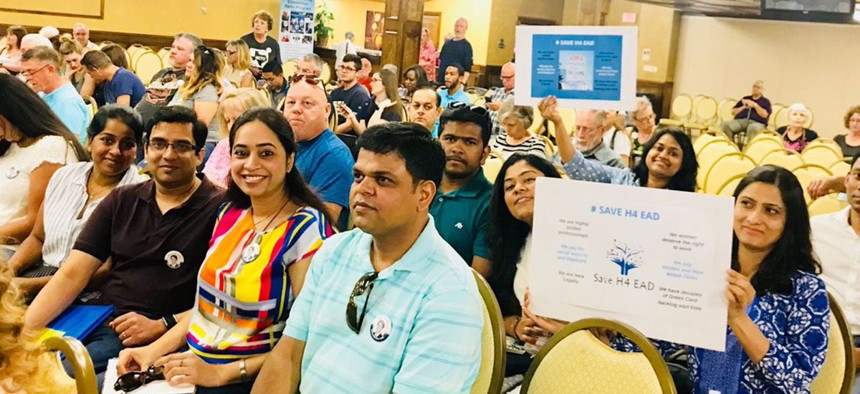Trump Leaves the Fate of Nearly 100,000 Indian H-1B Spouses in Limbo Again

Twitter/SAVEH4EAD
The deadline DHS set has ended.
For the second time this year, the Donald Trump administration has deferred a decision on H4 visa-holders’ right to work in the U.S.
In March this year, the Homeland Security Department had pushed its decision-making timeline from February to June. And now that deadline has ended, leaving the fate of thousands of immigrant workers in the U.S. hanging fire.
The H4 is a dependent visa category used by spouses of those holding the much sought-after H-1B long-term work visa. An outsized impact of this delay will be on Indians who hold nearly 80% of the H4s. Women, who account for nine in ten of the over 100,000 H4 visas issued annually, will particularly be affected, leaving them trapped in their “golden cages.”
Hurting Indian wives
For decades, spouses of H-1B holders could not work in the U.S. or even get a social security number. This left many highly qualified women, who’d left behind established careers in India, idling away at home in the U.S.
Things changed a little in 2015, when the Barack Obama administration allowed H4 visa-holders whose spouses were awaiting green card approval to seek work permits themselves.
However, the relief was short-lived. Since he took power in January 2017, Trump has been considering a decision to scrap the rule.
#H4EAD infused some “life” to many women who were just ‘staying’ in U.S. but not actually ‘living’ even after having a thriving career in their homelands but came to the “land of opportunities” with some hope. Pls don’t let this hope go in trash @USCIS @DHSgov @SaveH4EADs
— Kanupriya Dhiman (@kanudhiman) June 22, 2018
The reversal of this rule will hurt many families who will be forced to survive on a single income—a concern brought up by U.S. lawmakers a few months ago. “This barring of individuals from working, in this case spouses, it’s unfair,” U.S. Representative Anna Eshoo, whose district houses the headquarters of Google and Facebook, told SFGate. “What possible rationale is there for allowing one to work and one (to) not?”
The proposed move rests on “the underlying assumption that immigrants are taking jobs rather than being valued and protected for their immense contributions to this nation,” Lakshmi Sridaran, director of national policy and advocacy at non-profit South Asian Americans Leading Together, told Quartz earlier.





